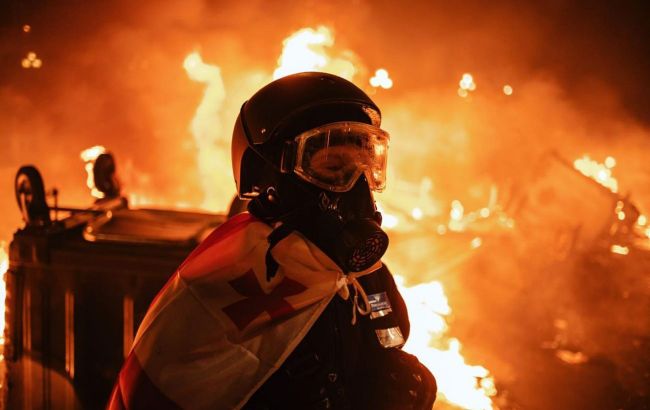Protests in Georgia: Security forces forcefully disperse crowd, multiple arrests
 Photo: The situation in the center of the Georgian capital is escalating (t.me/ekho_kavkaza)
Photo: The situation in the center of the Georgian capital is escalating (t.me/ekho_kavkaza)
On the evening of December 2, a protest continues in central Tbilisi in response to the Georgian government's delay in negotiations for EU membership. Special police forces are using tear gas and aggressively detaining participants, according to Newsgeorgia and Echo of the Caucasus.
The protesters initially gathered at Freedom Square near the parliament. However, around 10:00 PM (Tbilisi time), special forces approached from side streets and began forcibly dispersing the crowd, using water cannons and pepper spray.
Soon after, violent arrests were reported.
By 11:00 PM local time, most protesters had gathered at Republic Square.
A group of demonstrators wearing gas masks remained on Rustaveli Avenue.
Around midnight, the situation on Rustaveli Avenue escalated and then calmed down intermittently. It became impossible to stay on the avenue without a gas mask. The gas reached residents of nearby apartments.
A video also showed a barricade near the Opera House.
Protesters carried the injured to a medical point behind the Opera House.
Meanwhile, clashes occurred between protesters and police on Baratashvili Street, where the police used tear gas.
Protesters built a mobile barricade on wheels and moved it along the avenue, preventing the special forces from destroying it.
By 2:00 AM local time, tensions remained high on Rustaveli Avenue.
Updated 6:00 AM (Kyiv time)
This morning, protesters in Tbilisi once again blocked Chavchavadze Avenue, near the first building of Tbilisi State University.
By 6:00 AM, they had organized a move from Rustaveli Avenue without waiting for the usual police dispersal, which typically occurs at dawn.
Barricades and fires are now at the intersection of Melikishvili and Chavchavadze.
Around 8:00 AM (Tbilisi time), police and special forces used a water cannon near Tbilisi State University. Arrests have been made on Chavchavadze Avenue.
Protests in Georgia
In the parliamentary elections on October 26, the pro-Russian party Georgian Dream, led by Irakli Kobakhidze, won with 54% of the vote. Opposition parties received between 8 and 11%.
The elections were marred by numerous violations at polling stations, but the Central Election Commission refused to address these issues. Opposition leaders and parties rejected the election results and began protests in central Tbilisi.
On November 28, Prime Minister Kobakhidze announced that the government had decided to delay negotiations for Georgia’s EU accession until the end of 2028.
In response, opposition leaders and thousands of ordinary Georgians launched large-scale protests in Tbilisi, which have been ongoing for several days. Each night, special forces disperse the protests forcefully and make aggressive arrests.
Meanwhile, the United States suspended its strategic partnership mechanism with Georgia.
Georgian President Salome Zourabishvili is supposed to resign, but she has refused and does not recognize the election results as legitimate.
For more on the probability of the Georgian protests turning into a revolution, read RBC-Ukraine's analytical material.

